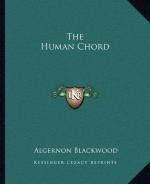“You used it all, of course, as a little boy,” she said presently again; “names, I mean?”
“Rather,” he replied without hesitation; “only I’ve rather lost it since—”
“It will come back to you here. It’s so splendid, all this world of sound, and makes everything seem worth while. But you lose your way at first, of course; especially if you are out of practice, as you must be.”
Spinrobin did not know what to say. To hear this young girl make use of such language took his breath away. He became aware that she was talking with a purpose, seconding Mr. Skale in the secret examination to which the clergyman was all the time subjecting him. Yet there was no element of alarm in it all. In the room with these two, and with the motherly figure of the housekeeper busying about to and fro, he felt at home, comforted, looked after—more even, he felt at his best; as though the stream of his little life were mingling in with a much bigger and worthier river, a river, moreover, in flood. But it was the imagery of music again that most readily occurred to him. He felt that the note of his own little personality had been caught up into the comforting bosom of a complete chord....
VII
“Mr. Spinrobin,” suddenly sounded soft and low across the table, and, thrilled to hear the girl speak his name, he looked up quickly and found her very wide-opened eyes peering into his. Her face was thrust forward a little as she leaned over the table in his direction.
As he gazed she repeated his name, leisurely, quietly, and even more softly than before: “Mr. Spinrobin.” But this time, as their eyes met and the syllables issued from her lips, he noticed that a singular after-sound—an exceedingly soft yet vibrant overtone—accompanied it. The syllables set something quivering within him, something that sang, running of its own accord into a melody to which his rising pulses beat time and tune.
“Now, please, speak my name,” she added. “Please look straight at me, straight into my eyes, and pronounce my name.”
His lips trembled, if ever so slightly, as he obeyed.
“Miriam ...” he said.
“Pronounce each syllable very distinctly and very slowly,” she said, her grey eyes all over his burning face.
“Mir ... i ... am,” he repeated, looking in the center of the eyes without flinching, and becoming instantly aware that his utterance of the name produced in himself a development and extension of the original overtones awakened by her speaking of his own name. It was wonderful ... exquisite ... delicious. He uttered it again, and then heard that she, too, was uttering his at the same moment. Each spoke the other’s name. He could have sworn he heard the music within him leap across the intervening space and transfer itself to her ... and that he heard his own name singing, too, in her blood.




